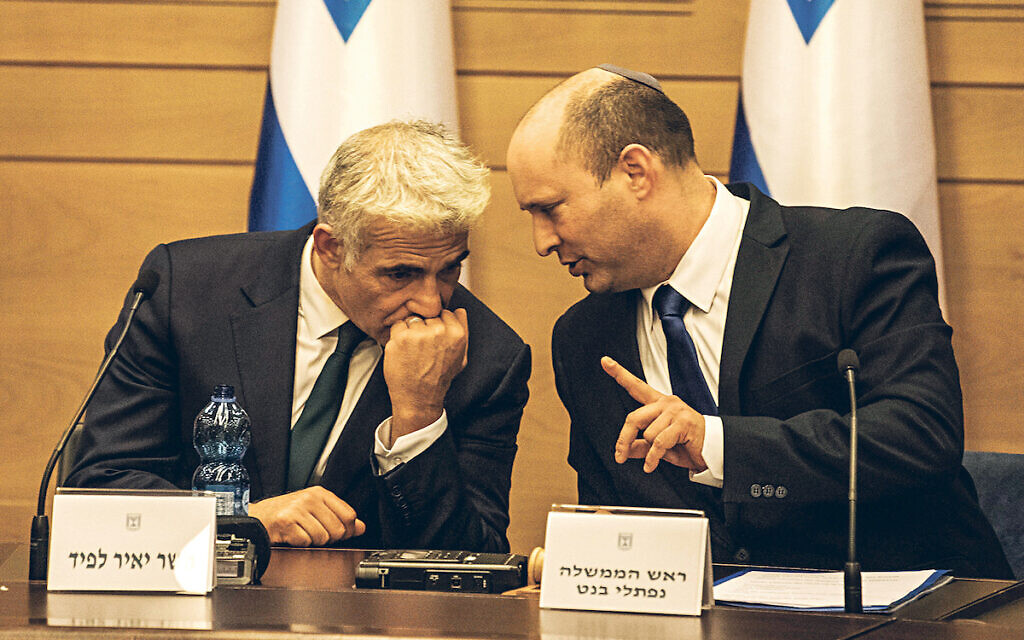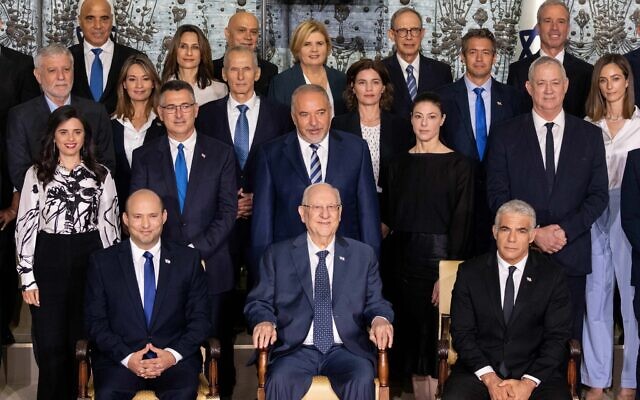How new PM Naftali Bennett has his work cut out
It’s all change in Israeli politics. Stephen Oryszczuk asks, what does it all mean, as he picks apart the details of the new coalition

Who is Israel’s new prime minister?
Naftali Bennett was an elite Israeli soldier who left the IDF to become a tech entrepreneur. He later entered local politics as a Jewish settler leader, then formed the religious-nationalist Yamina Party. Prag-matic in most areas, he is adamantly opposed to any Palestinian state and prioritises the continued building of settlements in the West Bank.
Did Bennett win power, or did Netanyahu lose it?
Get The Jewish News Daily Edition by email and never miss our top stories Free Sign Up
A bit of both. Nobody doubts Netanyahu’s many successes, improving Israel’s economic and security position and plotting the recent landmark détente with Gulf and Arab states. But BICOM director Richard Pater says his corruption trial, coupled with his mismanagement of ideological bedfellows like Bennett and Avigdor Lieberman, contributed to his downfall. Likud challengers may start making moves to replace him as party leader.
Will the Arab party remain a partner?
It is hard to tell. Its leader, Mansour Abbas, is known as a pragmatist who has already secured several guarantees from Bennett, including greater rights for Arab Israelis, especially on discriminatory housing policies. He has also been made a deputy minister with a sizeable budget for infrastructure in Arab areas. Lapid hopes this will be enough to keep him and his three other parliamentarians in play, but a repeat of the inter-communal violence seen in May would make that much more difficult. Even if there is no repeat, this is by far Israel’s most pluralist government, and in the wings sits a disgruntled Benjamin Netanyahu, who is skilled at sowing division.

What will Lapid do?
In his day job as foreign minister for the next two years, he will hope to shape Israel’s relations with the United States, Russia, Saudi Arabia, China, and key regional players like Jordan. He also has to negotiate with Hamas over Israel’s MIA (missing in action) and hostages, and with partners over natural gas in the Eastern Mediterranean, where Turkey has the potential to pose problems. All that seems easy compared with his other challenge – keeping the coalition from splintering.
What should we look out for?
Beyond Israel, analysts think that US President Joe Biden may smell an opportunity. “An X factor is how they’ll want to engage the Biden team,” said Joel Rubin, a former deputy assistant secretary of state under Obama. “A new fragile government will be hesitant to weaken the US-Israel relationship, so Biden will likely have more leeway now with the Israeli government than he did with Netanyahu in power.”

What’s at stake?
A lot. For a start, Israel wants an extra $1 billion from the US to help it replenish its stocks of the Iron Dome missile defence system, after last month’s 11-day conflict with Hamas. But not all US lawmakers are keen to cough up, and the longer a ceasefire holds, the weaker the Israeli argument will be, so an emboldened Biden may well hold out. A bigger yet connected concern is the fear that Israel may be losing its military edge in the region, with Egypt getting advanced US submarines and the Emiratis promised advanced American F-35 jets in return for agreeing to normalise ties with Jerusalem.

Thank you for helping to make Jewish News the leading source of news and opinion for the UK Jewish community. Today we're asking for your invaluable help to continue putting our community first in everything we do.
For as little as £5 a month you can help sustain the vital work we do in celebrating and standing up for Jewish life in Britain.
Jewish News holds our community together and keeps us connected. Like a synagogue, it’s where people turn to feel part of something bigger. It also proudly shows the rest of Britain the vibrancy and rich culture of modern Jewish life.
You can make a quick and easy one-off or monthly contribution of £5, £10, £20 or any other sum you’re comfortable with.
100% of your donation will help us continue celebrating our community, in all its dynamic diversity...
Engaging
Being a community platform means so much more than producing a newspaper and website. One of our proudest roles is media partnering with our invaluable charities to amplify the outstanding work they do to help us all.
Celebrating
There’s no shortage of oys in the world but Jewish News takes every opportunity to celebrate the joys too, through projects like Night of Heroes, 40 Under 40 and other compelling countdowns that make the community kvell with pride.
Pioneering
In the first collaboration between media outlets from different faiths, Jewish News worked with British Muslim TV and Church Times to produce a list of young activists leading the way on interfaith understanding.
Campaigning
Royal Mail issued a stamp honouring Holocaust hero Sir Nicholas Winton after a Jewish News campaign attracted more than 100,000 backers. Jewish Newsalso produces special editions of the paper highlighting pressing issues including mental health and Holocaust remembrance.
Easy access
In an age when news is readily accessible, Jewish News provides high-quality content free online and offline, removing any financial barriers to connecting people.
Voice of our community to wider society
The Jewish News team regularly appears on TV, radio and on the pages of the national press to comment on stories about the Jewish community. Easy access to the paper on the streets of London also means Jewish News provides an invaluable window into the community for the country at large.
We hope you agree all this is worth preserving.
-
By Brigit Grant
-
By Laurent Vaughan - Senior Associate (Bishop & Sewell Solicitors)
-
By Laurent Vaughan - Senior Associate (Bishop & Sewell Solicitors)
-
By Laurent Vaughan - Senior Associate (Bishop & Sewell Solicitors)
-
By Laurent Vaughan - Senior Associate (Bishop & Sewell Solicitors)






















